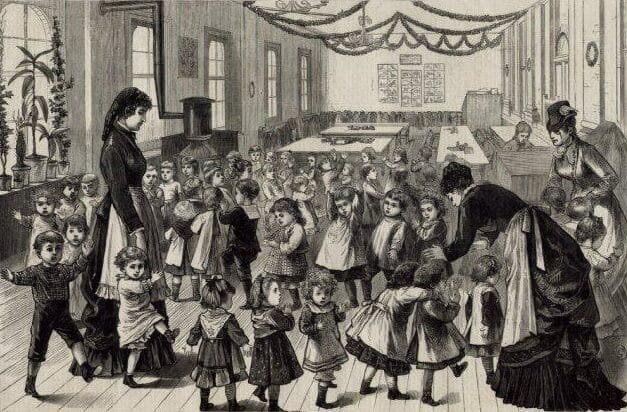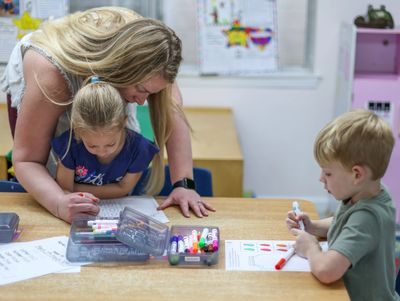The Importance of Interactive Tasks in Quality School Education
Interactive activities play a vital role in elementary school education and learning. They involve pupils and improve finding out outcomes. With group tasks and hands-on experiments, pupils experience the product in a sensible means. This strategy deals with diverse discovering designs and advertises necessary abilities. However, the benefits prolong past academics. Exploring the much deeper effect of these tasks exposes their relevance fit young learners' futures. What changes occur when pupils proactively participate?
Enhancing Interaction Through Interactive Discovering
Typical training techniques have their qualities, interactive understanding substantially improves trainee interaction in grade school education. This strategy encourages active engagement, allowing students to submerse themselves in the discovering procedure. By making use of group tasks, hands-on experiments, and technology-driven sources, educators create a setting where trainees feel much more linked to the material.
Interactive discovering assists in collaboration amongst peers, promoting communication skills and synergy. It likewise caters to varied learning styles, making sure that visual, acoustic, and kinesthetic learners can all grow. Furthermore, students are most likely to maintain details when they actively take part, in contrast to passively getting expertise.
This vibrant technique not just makes discovering pleasurable but likewise instills a feeling of possession in students regarding their instructional journey. As they involve with the web content, their curiosity and motivation to discover rise, laying a strong foundation for future scholastic success.
Creating Crucial Assuming Abilities
Interactive understanding not just enhances interaction however additionally works as a stimulant for creating essential thinking skills in grade school pupils. Via activities such as problem-based knowing, discussions, and hands-on experiments, pupils are urged to evaluate details, review different perspectives, and create reasoned verdicts. These interactive experiences call for pupils to question assumptions, leading them to assume even more deeply concerning different topics.

Moreover, interactive tasks usually existing real-world circumstances that challenge students to apply their knowledge artistically. By steering via these obstacles, they find out to recognize relevant information and make informed decisions. This process promotes not only private important reasoning yet likewise encourages pupils to verbalize their believed processes, boosting their capability to interact properly. Therefore, interactive understanding atmospheres cultivate a generation of important thinkers who are much better prepared to deal with complex issues in their future scholastic and expert undertakings.
Fostering Collaboration Among Peers
Fostering collaboration among peers is important in elementary school education, as it enhances synergy and interaction skills. Participating in team tasks helps students build depend on and respect for one an additional, preparing for effective cooperation. In addition, analytical together allows trainees to find out from each other and develop a cumulative technique to difficulties.
Team Effort and Interaction Abilities
Reliable teamwork and communication skills are vital elements of a successful elementary school education and learning. Taking part in interactive tasks urges trainees to collaborate, share concepts, and resolve problems with each other. Such experiences promote the growth of vital communication capacities, enabling children to reveal their ideas plainly and listen proactively to others. Via team effort, pupils find out to value diverse viewpoints, fostering a feeling of community and shared duty. Structured group tasks, whether in academics or imaginative jobs, improve peer communications, teaching children how to work out duties and deal with disputes. These abilities not just add to a positive classroom setting yet also prepare pupils for future collaborative ventures in greater education and learning and the office. Generally, synergy and communication are fundamental to all natural growth in elementary school.
Building Trust and Regard
Structure count on and regard amongst peers functions as a cornerstone for effective collaboration in elementary school settings. When students feel valued and appreciated by their classmates, they are more probable to engage actively in team tasks. Interactive tasks, such as team projects and participating video games, provide opportunities for pupils to discover from each other, fostering a sense of community. This atmosphere encourages open interaction, permitting pupils to reveal their ideas and point of views without fear of judgment. As trust fund constructs, pupils become extra ready to share obligations and support each other's understanding. Ultimately, growing an environment of trust and regard enhances not only academic outcomes however likewise social growth, gearing up pupils with crucial interpersonal abilities for their future ventures.
Problem-Solving With each other
Joint problem-solving engages trainees in vital reasoning and team effort, crucial abilities for their scholastic and personal growth. When trainees function together to deal with challenges, they find out to communicate successfully, regard diverse viewpoints, and leverage each other's strengths. This process boosts their ability to examine troubles from numerous angles and develop innovative options. Team tasks, such as scientific research experiments or math difficulties, promote active involvement and promote a feeling of neighborhood. As students work together, they additionally develop social abilities, discovering to bargain and endanger, which are crucial for future interactions. Ultimately, analytic with each other grows an encouraging discovering environment, empowering students to take possession of their education while preparing them for joint undertakings past the class.
Encouraging Imagination and Development
Motivating creativity and development in elementary school education and learning can be greatly boosted through hands-on discovering experiences. These tasks permit trainees to engage read more directly with principles and materials, promoting imaginative thinking. Furthermore, collective team tasks can promote diverse concepts and options, even more supporting a creative environment.
Hands-On Understanding Knowledge
A plethora of hands-on discovering experiences substantially improves imagination and development in elementary school education and learning. Involving students in functional tasks allows them to apply academic expertise in real-world contexts, promoting much deeper understanding. By manipulating materials and tools, children develop vital problem-solving abilities and learn to believe outside package. These experiences inspire curiosity and motivate pupils to explore their passions even more. In addition, hands-on tasks can connect various subjects, connecting science, art, and mathematics in significant ways. This interdisciplinary approach urges trainees to see links and think artistically. Ultimately, hands-on learning experiences nurture a generation of pioneers, equipping them with the skills and confidence required to deal with future obstacles and contribute to culture in unique methods.
Collaborative Team Projects
Hands-on understanding experiences naturally result in the unification of collaborative group projects, which play an important role in fostering creativity and development in quality institution education. These tasks encourage students to collaborate, sharing concepts and viewpoints, which improves analytical abilities and crucial thinking. Through cooperation, pupils learn to communicate successfully and regard varied perspectives, essential skills for their future. In addition, team tasks provide opportunities for students to trying out different roles, increasing their adaptability and confidence. Participating in this participating atmosphere enables them to discover their creativity, pushing the boundaries of typical understanding. Inevitably, joint group tasks not just enrich the educational experience yet also prepare trainees for real-world difficulties that call for synergy and cutting-edge thinking.
Building Confidence and Self-reliance
As trainees take part in interactive tasks, they usually discover opportunities to develop confidence and independence. These tasks, whether they include hands-on projects, role-playing, or analytic jobs, motivate trainees to take effort and reveal their ideas freely. By taking part in such experiences, pupils discover to trust their capabilities and make choices without depending entirely on guidance from peers or instructors.
Interactive tasks foster a feeling of possession over knowing. They develop important thinking abilities and strength when trainees take on difficulties collaboratively or independently. This procedure not only boosts their understanding of the find more information subject however likewise equips them to take risks in their understanding journey.
As they browse various interactive scenarios, students progressively shed their self-doubt, leading the way for increased self-worth - Grade School. Ultimately, these tasks play a necessary role in nurturing independent and certain learners, geared up to deal with future scholastic and individual obstacles
Creating a Positive Class Setting
While cultivating a positive classroom environment is crucial for effective understanding, it requires deliberate effort from teachers to develop a room where pupils really feel secure, respected, and engaged. A positive atmosphere encourages collaboration, permitting pupils to share themselves without anxiety of judgment.
Educators can accomplish this by developing clear assumptions, promoting shared respect, and identifying specific payments. Including interactive tasks better enhances involvement, making finding out more enjoyable and dynamic.
Furthermore, a caring environment sustains social-emotional development, as pupils find out to browse partnerships and deal with disputes. Teachers play a vital function in modeling positive behavior and enhancing a society of kindness and inclusivity.
Often Asked Inquiries

Exactly How Can Parents Support Interactive Knowing in your home?
Parents can support interactive understanding in the house by supplying interesting products, encouraging hands-on jobs, including academic video games, promoting discussions, and developing a nurturing atmosphere that promotes inquisitiveness and exploration in their kids's discovering experiences. (Grade School)
What Sorts Of Interactive Tasks Are A Lot Of Effective?
Hands-on tasks, collective video games, role-playing situations, and educational modern technology applications are amongst the most reliable interactive activities. These involve students, enhance crucial thinking skills, and promote teamwork, eventually cultivating a much deeper understanding of different topics.
How Do Interactive Tasks Satisfy Different Learning Styles?
Interactive tasks engage aesthetic, auditory, and kinesthetic students by incorporating diverse methods. These tasks promote comprehending through hands-on use this link experiences, collective conversations, and aesthetic help, allowing pupils to absorb information according to their recommended knowing design.
What Are the Prices Linked With Applying Interactive Activities?

Executing interactive tasks incurs costs such as materials, training for educators, technology upgrades, and possible facility alterations. Spending plan constraints can likewise impact the regularity and variety of activities used to pupils in academic setups.
Just How Can Teachers Examine the Impact of Interactive Discovering?
Teachers can examine the influence of interactive knowing via observations, pupil responses, performance metrics, and relative analysis of examination scores prior to and after execution, making certain a detailed understanding of interaction and expertise retention enhancements.
With tasks such as problem-based knowing, disputes, and hands-on experiments, students are encouraged to examine information, assess various perspectives, and develop reasoned final thoughts. Interactive tasks usually present real-world situations that challenge students to use their expertise artistically. Involving in interactive activities motivates students to work together, share ideas, and solve problems with each other. Interactive tasks, such as group jobs and cooperative video games, give opportunities for trainees to discover from one another, cultivating a feeling of community. As students engage in interactive activities, they typically uncover possibilities to develop confidence and freedom.